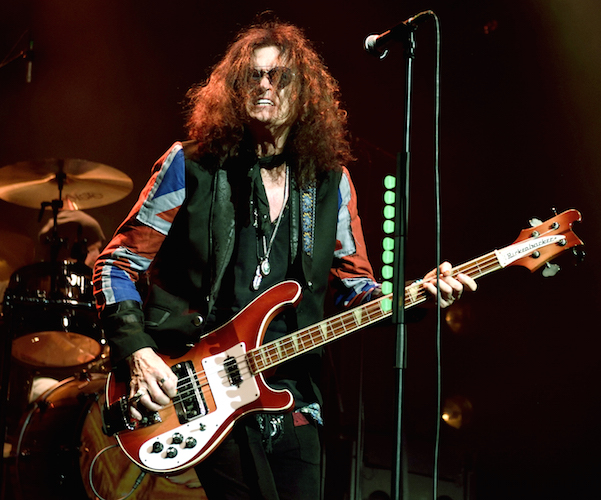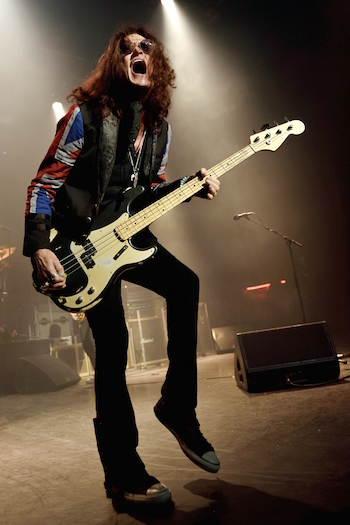Rock Preview: Glenn Hughes Sings Deep Purple — Slightly Unhinged
“I went back and listened to the records and watched videos of performances. I got into character for this,” Glenn Hughes confesses.

Deep Purple’s Glenn Hughes — “There’s a lot of love for these songs, and I’m playing them better now since I’m not drinking or using drugs.” Photo: courtesy of the artist.
By Scott McLennan
It’s not enough to ask someone, “So, are you a fan of Deep Purple?” To really get to the heart of the matter, you need to ask, “So, which Deep Purple are you most a fan of?”
To the casual observer—the person who knows the riff to “Smoke on the Water” or pushes down a little harder on the accelerator when “Space Trucking” comes on the car radio—there is one Deep Purple.
But Deep Purple’s long and still active career can be split into distinct eras that DP acolytes have delineated as eight different lineups labeled Mark I through Mark VIII (plus a few sub-Marks denoting the return of members).
Glenn Hughes played bass and sang in the Mark III and Mark IV versions of Deep Purple, and is revisiting that era of the band’s music with a tour that lands in the Wilbur Theater on Sept. 19.
What this means for Deep Purple fans is a chance to hear material on the albums Burn, Stormbringer, and Come Taste the Band, the records made when Hughes and singer David Coverdale joined the group after the high-profile departures of singer Ian Gillan and bassist Roger Glover.
“There’s a lot of love for these songs, and I’m playing them better now since I’m not drinking or using drugs,” Hughes said when reached by phone after having logged a few U.S. dates of the “Classic Deep Purple Live” tour he began last year in Europe and plans to keep active around the globe for the next 18 months amid other projects.
“No one else is doing these songs,” Hughes said. “David is done with them.”
And there’s no chance that the current lineup of Deep Purple, with Gillan back on lead vocals, will do songs from the Hughes/Coverdale era.
The run from Burn to Come Taste the Band was an interesting one. Deep Purple’s Machine Head album from 1972 was hugely successful and helped define a burgeoning brand of hard rock that was both progressive and heavy.
Feeling burned out, Gillan and Glover departed the band in 1973. Guitarist Ritchie Blackmore, keyboard player Jon Lord and drummer Ian Paice recruited Hughes from the up-and-coming band Trapeze and found Coverdale through an audition process.
This new version of Deep Purple put out Burn in 1974, showcasing a sound that was a bit more boogie and blues. Hughes and Coverdale split vocal duties: the former had a knack for the upper registers of rock wailing and the latter brought a muscular swagger to the mix. The title track became a big enough hit to secure Deep Purple’s place in the big leagues despite the change in vocalists and shift in sound.
“The band was open to changes when David and I joined,” Hughes said. “We could have made ‘Machine Head 2’, but the band didn’t want to do that.”
But perhaps the bluesier and funkier tones of Stormbringer went a bit too far, because after that album Blackmore quit the band that he helped found in 1967. Deep Purple replaced Blackmore with guitarist Tommy Bolin and that lineup released Come Taste the Band in 1975.
But both Hughes and Bolin were hobbled by drug use and Deep Purple’s live shows became erratic to the point that the group disbanded in early 1976. Later that year, Bolin died from a drug overdose. Coverdale went on to find more success in the band Whitesnake.

Glenn Hughes in action. Photo: Eric Duvet.
Hughes spent the remainder of the ‘70s and ’80s with various projects as both a band member and band leader.
In the ’90s, Hughes addressed the addiction and health problems that had been undermining his career and has gone on to many successful projects, including the band Black Country Communion and collaborations with guitar whiz Joe Satriani.
Hughes most recently generated radio notice with a version of The Police’s “Roxanne” he recorded to benefit Rock Against Trafficking, an artistic organization that draws attention to efforts to prevent human trafficking.
To return to the slightly unhinged and rough-hewn Deep Purple material of the mid-’70s, Hughes admitted that he had to be “in the right head space, both physically and spiritually.” He assembled a new band to tackle the material and described the performances as “raw” and “flying by the seat of our pants.”
“I went back and listened to the records and watched videos of performances. I got into character for this,” he confesses.
As he and Coverdale did during their tenure in Deep Purple, Hughes still performs Gillan signatures “Smoke on the Water” and “Highway Star.”
“I’m not uncomfortable singing them, and the fans like the way I approach those songs. I’m not comfortable doing other songs, like ‘Lazy’ or ‘Space Trucking.’ The way I end ‘Smoke on the Water’ with ‘Georgia on my Mind’ is how we used to do it in the ‘70s.”
Coverdale and Hughes typically divided vocal duties within songs. But Hughes said he has no problem covering all the verses on his own.
“I’ve been singing Burn on my own for 45 years,” he said.
Scott McLennan covered music for the Worcester Telegram & Gazette from 1993 to 2008. He then contributed music reviews and features to The Boston Globe, The Providence Journal, The Portland Press Herald and WGBH, as well as to the Arts Fuse. He also operated the NE Metal blog to provide in-depth coverage of the region’s heavy metal scene.

